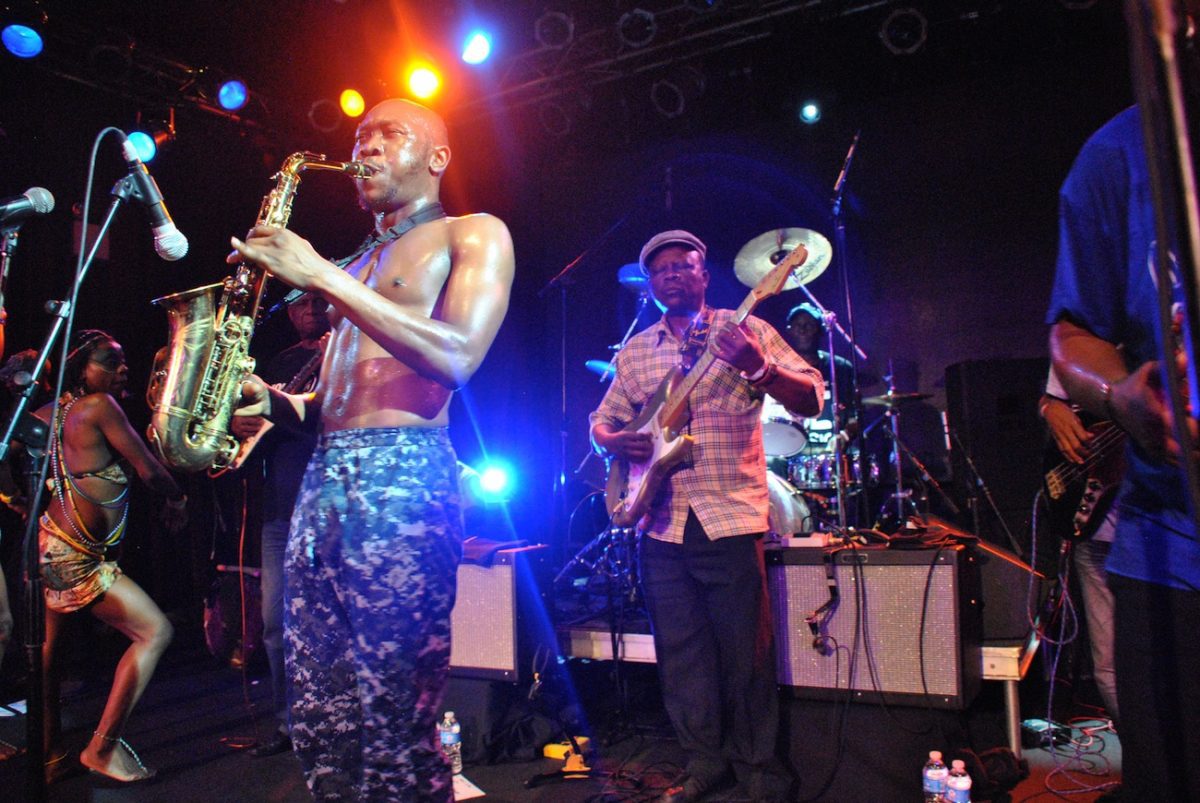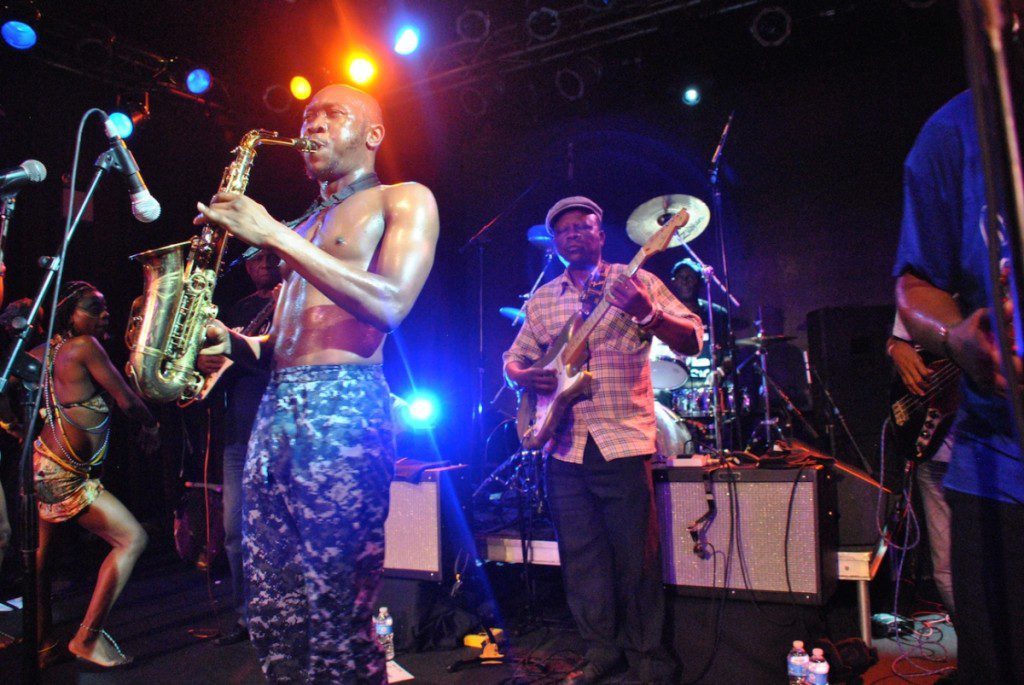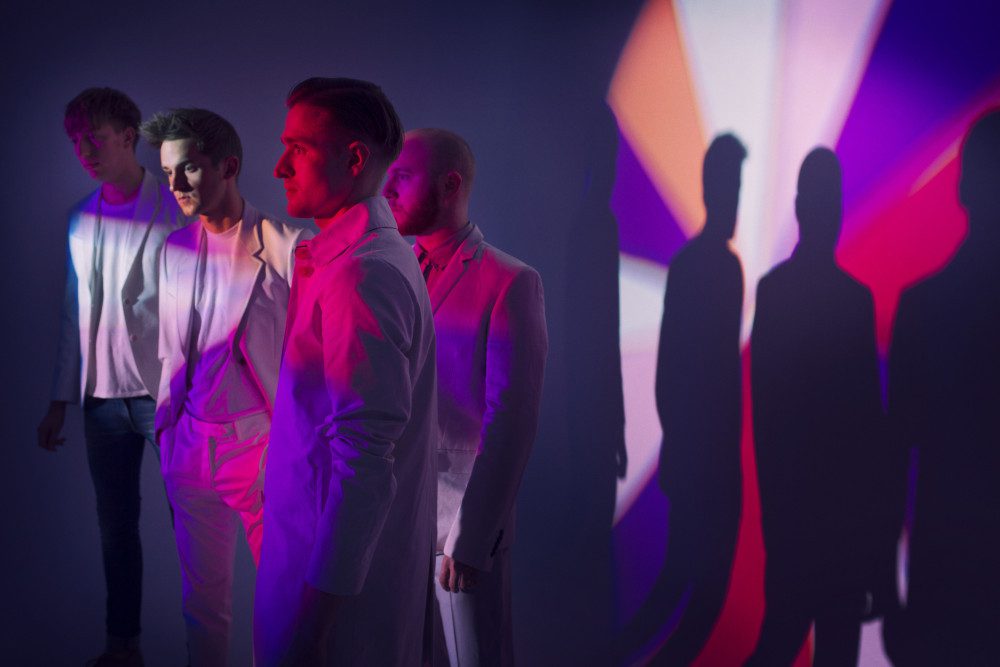
A gourd is a good omen. It was strung off the mic stand on stage left of the Highline Ballroom like a nectar-heavy plum, latticed with beads and primed to drop any second. I was trying to sort out the stage set-up…guessing how many band members would be waltzing out to accompany Seun Kuti come set time. I could identify most of the instruments despite a whale-sized hand drum lying on its belly with two-inch block letters carved in the side. It was clearly a percussion instrument, but like none I’d ever seen. The behemoth cylinder summed up the evening to come: I had a vague idea of how everything would go, but I didn’t really know what I was getting into.
When I first heard Seun Kuti’s name, I figured he was related to the late Afrobeat pioneer and political activist Fela Kuti. What I came to discover was that Seun is in fact Fela’s youngest son, and he’s been touring with his father’s original backing band Egypt 80 for half of his life. Only 14 when his father passed, Seun immediately became the lead singer of Egypt 80, and his 17 years of performing have made an enviably captivating and gifted musician of him.
When I arrived at the Highline Ballroom, I waded through the venue’s usual crowd of young urban professionals sipping Stella Artois. DJ Rich Medina was spinning both traditional and revivalist Afrobeat tossed in with Sharon Jones and the Dap Kings and other bands I wished my LG flip-phone could have Shazammed. There was a buzz in the crowd–a sort of communal knowledge that the moment Egypt 80 came out, we’d all be dancing far too hard. I kept staring at that beaded gourd, grinning with the kind of anticipation that brews right before an energetic performance. I mean, how often do we get to see a 12+-piece ensemble these days? We see a guy with a laptop and an effects pedal and we call it a band, but this is a full band.
Medina’s set eventually dies down. Egypt 80’s 73-year-old keyboardist Lekan Animashaun steps on stage in a boldly printed tunic with matching hat and pants. “Good evening, gentlemen and ladies” he says in a thick Nigerian accent.
I immediately see where this is going.
“I say gentlemen and ladies, because, where I come from, the man comes first.”
It was like a record scratching. Lekan’s culturally-fueled, tepid sexism immediately watered down my state of elation. It doesn’t help that I write for a feminist music outlet, but after unavoidable wincing I managed to refocus on becoming excited again, despite the unnecessary remark.
The remainder of Egypt 80 poured onto the stage. 11 musicians and a pair of back-up singers/dancers, both scantily clad beauties with Crayola-hued face paint and beads dripping off every bit of them. The group played a song written by Lekan, a bit more on the traditional side of Nigerian music than what I’d heard from Seun’s recordings. Naturally this number served as an intro for Seun, who came prancing out shortly after its conclusion.
He practically flew onto stage, an alto sax slung around his neck, decked out in slate blue digital camouflage pants, a matching button-up, and of course, loafers of the same print and color. I was dumbstruck by how attractive he was. He has a powerful, feline face with a wide set nose and flaring nostrils that suggest fury even when he’s grinning.
Seun was performing in overdrive from minute one. When he wasn’t singing, he was wailing on sax, never ceasing to dance in either scenario. It was a small stage for 14 people to occupy, and he managed to make it microscopic considering how much space he monopolized. He moved in staccato, ass-out, flailing gyrations that were as sexy as they were foreign. His particular style of dance exemplified the charm and arrogance that make up his character: at one point he referred to himself as “a very beautiful man.” You’d like to argue, but he’s not wrong in the least.
With the help of his back-up singers Seun removed his shirt, revealing a “Fela Lives” tattoo across the width of his shoulder blades. Throughout the set he paid respects to his deceased father, interspersed with political diatribe denouncing the Westernization of African women and the IMF, or “International Mother Fuckers” as Seun coined it. Though as impassioned as his speeches were, his geriatric band seemed to be rolling their eyes behind his bare back. Few of them under 60, they responded to Seun’s energy like cynical uncles that used to babysit him. It was as if they were saying: “You think you’re a hotshot now, but we’ve all changed your diapers.” To make matters worse, Seun was literally flicking sweat all over them with every gesture-I saw the bassist flinch several times, just slightly dodging bullets of perspiration.
Though the subject matter driving Kuti’s music is far from cheerful, his music is undeniably upbeat and danceable. Steady drums anchor searing horns and jubilant vocal melodies…it’s truly music anyone could enjoy. But Afrobeat’s contagiously kinetic nature doesn’t deny its origins; this is protest music, but not the sort that is sung as a device of nostalgia or Western ennui. The issues Seun describes are current and severe, dealing predominantly with the exploitation of African resources and the attempted bleaching of Nigerian culture. The most exhilarating aspect of Kuti is his ability to relay these political messages with a shameless rage that is lacking in most contemporary music, and then move an entire room to dance at the same time. It’s the kind of magnetism his father had, and would no doubt be proud of. “Fela Lives” indeed.




